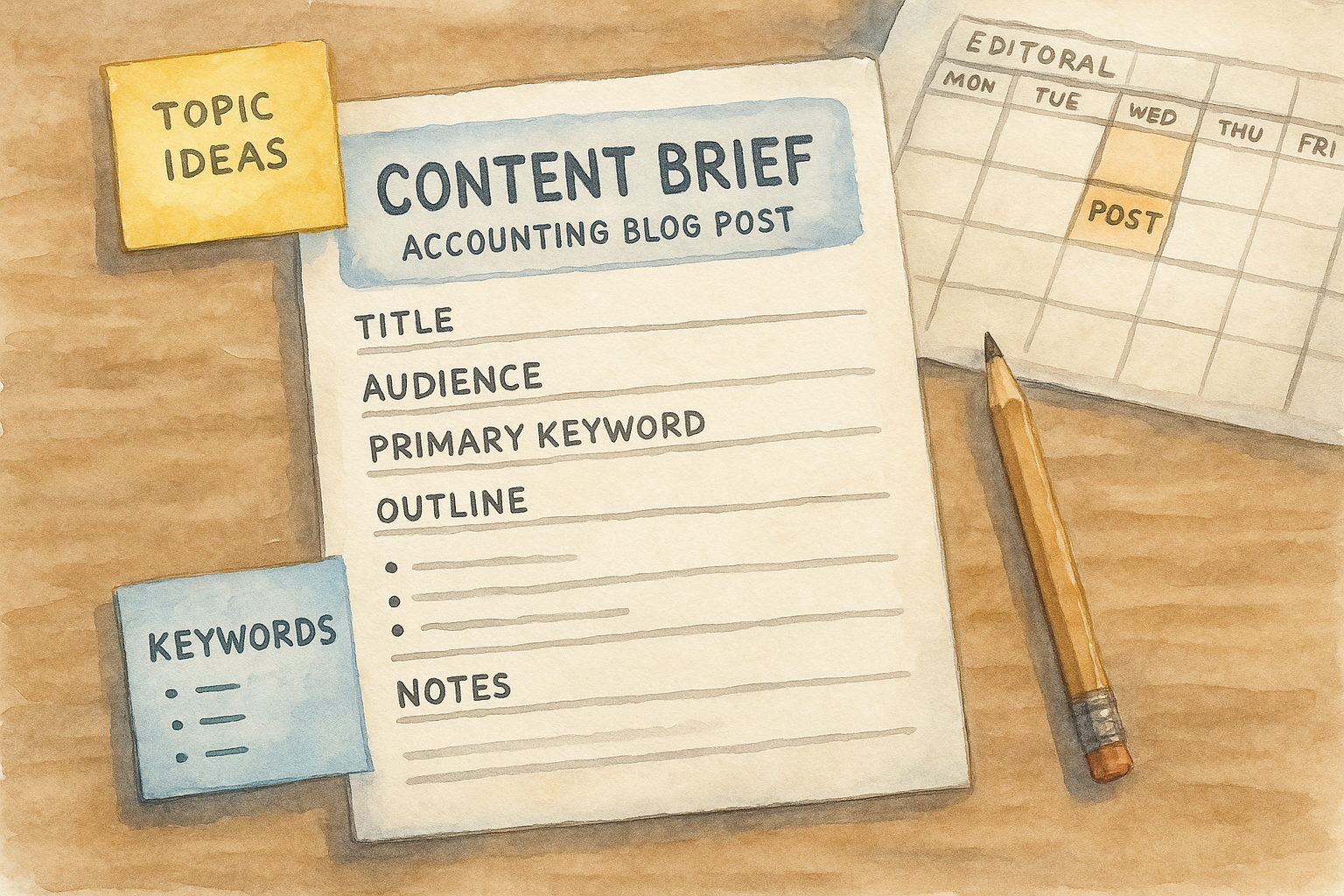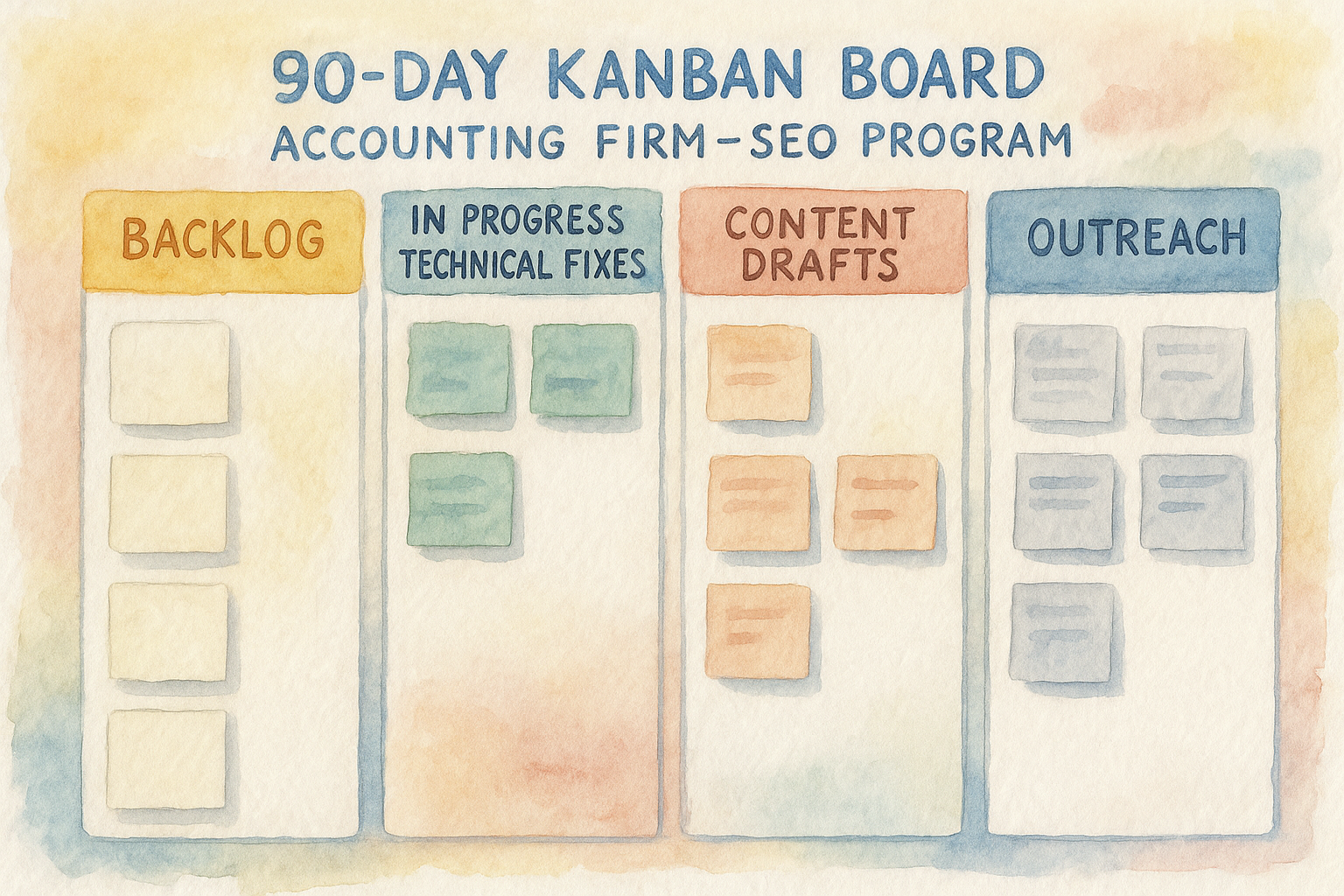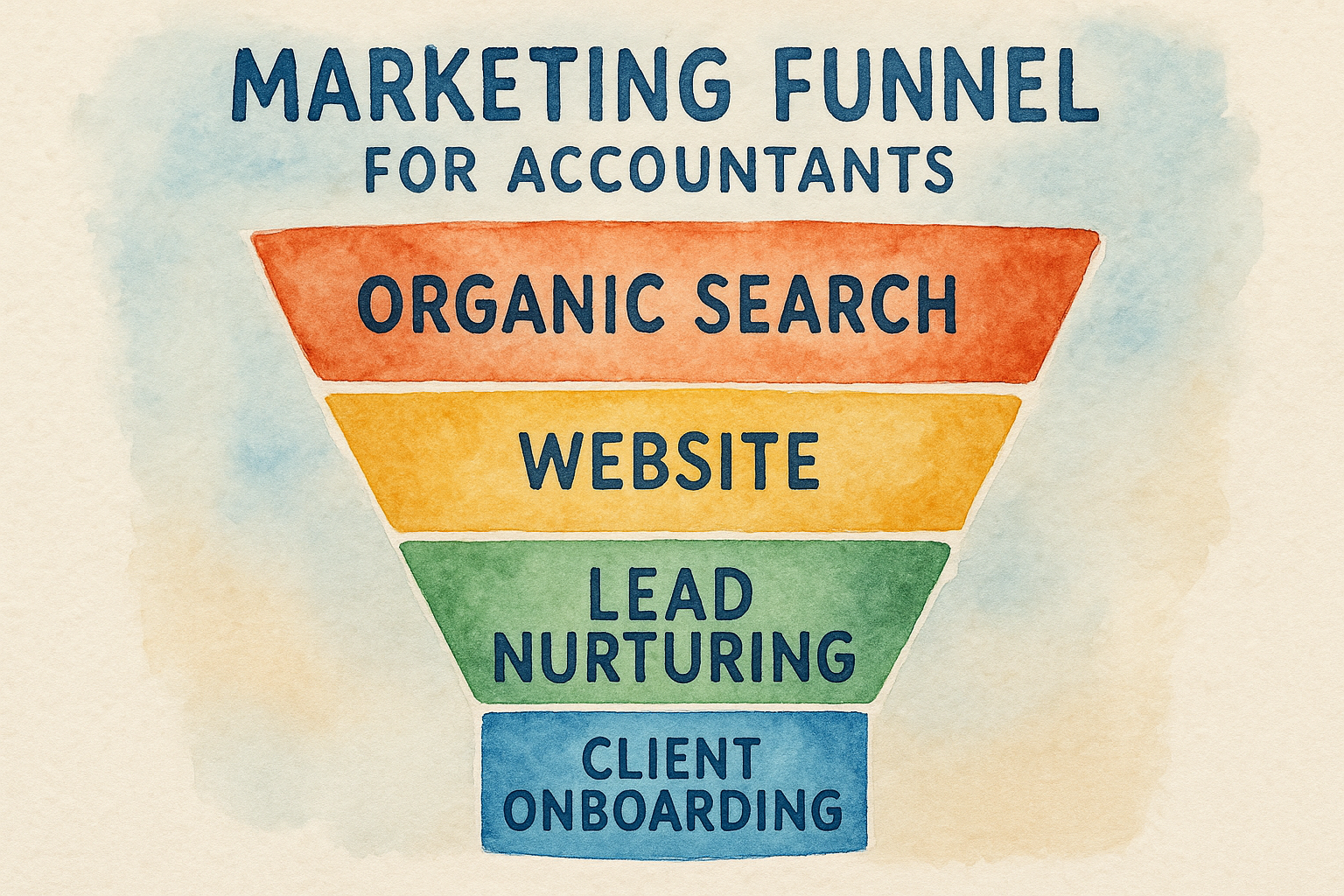Most accounting clients begin their buyer journey with a Google search.
But what exactly is an seo agency for accountants, and how do you pick one that actually moves the needle?
This guide is a complete hiring cheatsheet: checklists, vendor questions, 90/180/365 day plans, pricing norms, sample scopes and templates you can use immediately.
Some are boutique firms that write technically precise content for tax and audit topics.
Some are local specialists who dominate Google Business Profile and the map pack.
Some are technical teams that fix migrations, speed and schema so your pages can rank.
Some are content mills — cheap, fast, and often surface-level.
Some are PR-first agencies that earn links through thought leadership and data releases.
Let's dive right in.
Why your firm needs a specialist seo agency for accountants
The search behavior and trust requirements for accounting services are unique — people aren't shopping for a commodity; they are hiring a fiduciary. That changes keyword intent, content tone, legal compliance needs and the conversion funnel. A generalist SEO might improve traffic, but a specialist aligns content and compliance with buyer intent so traffic converts to consultations and clients.
Three short truths up front:
- Accountant search intent is high-stakes and high-trust: queries like "tax planning for startups" or "audit services for nonprofits" indicate commercial intent and require authoritative answers.
- Compliance and credentials matter in content and UX: CPAs, EAs, and licensed tax preparers need accurate bios, credentials and disclaimers to build trust and avoid regulatory issues.
- Local vs national strategy dramatically changes the playbook: single-location CPAs should prioritize Google Business Profile; multi-location firms need landing page architectures and local schema.
Why this matters practically: firms that invest in niche SEO see higher lead quality for the same traffic volumes. Vetting is harder because you must evaluate industry knowledge as well as SEO chops. A measured vendor will ask about your fee structure, average client lifetime value and service packaging before committing to a keyword plan.
Note: agencies that specialize in accounting or professional services tend to produce more technically accurate content and safer link strategies. See how research-driven lists approach agency vetting at Focus Digital's roundup for examples of evaluation criteria and agency profiling.

Core services an SEO agency for accountants must offer
When you interview agencies, ensure they can deliver on these core pillars. Each pillar includes both tactical deliverables and decisions you’ll need to make as a firm.
Technical SEO & site architecture
What you should expect: a crawl audit, prioritized technical fixes (redirects, canonical tags, robots.txt, XML sitemap), mobile friendliness, HTTPS, and a plan for page speed. For accountants, architecture matters: services, industries, locations, resources and team bios should be organized so users and search engines can navigate the buyer journey.
Detailed checklist:
- Full site crawl and JavaScript rendering checks (Screaming Frog, sitebulb or equivalent).
- PageSpeed recommendations (core web vitals) and action items to fix render-blocking resources.
- Review of indexability and canonicalization — firms with seasonal pages (tax season landing pages) need controlled indexation strategies.
- Structured internal linking to keep every service page within 1–2 clicks of the homepage.
Local SEO & Google Business Profile optimization
Most single-location accounting firms get the majority of local leads from the Google Business Profile (GBP) and the local pack. Ask agencies about: GBP categories, reviews strategy, photos, GBP posts, citation cleanup, and how they will coordinate NAP consistency across directories.
Quick evidence: agencies that invest in GBP and local signals often produce immediate wins in phone calls and map visibility — sometimes within weeks. For a practical hands-on approach to GBP and citation prioritization, see local tactics and vendor examples in the industry analysis at Focus Digital.
Content strategy tailored to accounting practices
Content must be accurate, trust-building and mapped to the buyer's stages: awareness (guides, explainers), consideration (service comparisons, case studies), decision (consultation landing pages). Keyword research for accountants is foundational — a measured process that blends search volume, relevance and search intent. CPA Site Solutions describes keyword research as the electricity for your SEO engine; preserve that metaphor when you plan your content calendar: keywords power discovery and conversions. See a practical keyword workflow at CPA Site Solutions.
Content deliverables your agency should offer:
- Pillar pages for primary services (tax, bookkeeping, payroll, advisory).
- Seasonal content timed to tax deadlines and regulatory changes.
- Industry-specific content for niches you target (restaurants, SaaS, construction).
- Lead magnets: checklists, calculators, templates gated behind a consultation CTA.
- Editorial process: briefs with search intent, target keywords, schema recommendations and internal linking plan.

On-page optimization & schema
On-page matters: title tags, meta descriptions, H2s, content structure, and FAQ/FAQPage schema. Use LocalBusiness / ProfessionalService schema and include credentials in markup where relevant. Schema for events (webinars) and FAQs can increase SERP real estate.
Link building & digital PR for accountants
Backlinks remain a core ranking signal. High-value opportunities for accountants include: local chambers, professional associations (e.g., state CPA societies), partner vendors, client industry publications, guest posts on finance blogs and HARO mentions. PR-led content — reports, surveys, commentary on tax changes — can earn authoritative links and brand mentions.
Tip: expect outreach to be slower for compliance-sensitive content. Agencies that rely on genuinely earned coverage and partnerships outperform link-farms and PBN approaches. See vendor breakdowns and risks in agency lists at Focus Digital.
Conversion Rate Optimization (CRO) and landing pages
SEO for accountants must be revenue-focused. Your agency should build CRO-optimized landing pages, run A/B tests on headlines and forms, add trust signals (CPA badges, client logos, anonymized case studies), and implement call tracking for phone-first conversions.
Conversion elements checklist:
- Short contact forms that capture qualifying info (industry, revenue range, services interested in).
- Clear CTAs: book a consult, call now, download checklist.
- Phone tracking with dynamic number insertion (DNI) for PPC vs organic attribution.
- Heatmaps or session recordings for top landing pages to guide UX tweaks.
Analytics, reporting & lead tracking
Implement GA4 with server-side or enhanced conversion tracking, CRM integration (HubSpot, Salesforce, or your system), UTM conventions, and lead-to-revenue mapping. Reports should show organic sessions, goal completions and revenue attribution, not just vanity metrics.
How to evaluate and choose the right SEO agency
Evaluating agencies is both art and science. Use a standardized RFP and score vendors on domain expertise, process, transparency and references. Below is a practical checklist and suggested discovery questions.
Checklist of qualifications and red flags
- Proven experience with accounting or professional services clients.
- Case studies with transparent KPIs (traffic, leads, conversion uplift).
- Ability to execute technical fixes or work via your developer.
- Documented content process and fact-checking for technical topics.
- Ethical link-building with no black-hat promises.
- References you can call — ask for both wins and failures.
- Understanding of local search and Google Business Profile optimization.
Red flags to avoid:
- Guarantees of #1 rankings (no responsible agency promises that).
- Lack of case studies or inability to provide client references.
- Proposals with vague deliverables and no milestones.
- Black-hat backlink tactics or bulk directory promises without quality control.
- Requests to hand over domain-level control without clear IP and access terms.
Questions to ask during discovery calls
- Have you worked with accounting firms? Can you share examples?
- How do you approach technical SEO and content for professional services?
- What is your link-building strategy for a compliance-sensitive industry?
- How do you measure leads and attribute traffic to revenue?
- What reporting cadence and format will I receive?
- Who will be our day-to-day contact and who handles strategy?
- What are expected milestones in the first 90 days?
Practical tip: ask vendors to share a short sample audit for free — a 2–4 page snapshot that shows technical crawl highlights, GBP status, content gaps and top 10 keyword opportunities. Great agencies will provide detailed, actionable previews. For vendor lists and specializations, read industry vetting at Focus Digital.
Pricing models and expected budgets
Budgeting sets realistic expectations. SEO isn’t an instant ROI channel; it’s a compound investment. Use the chart below as a starting point, then model lead value and payback to find the right retainer.
Typical pricing ranges
- Solo or micro firms: $1,000–$3,000/mo — GBP, basic content and citation work.
- Small firms (2–10 people): $2,500–$6,000/mo — local + content + outreach.
- Mid-size firms (10–50): $5,000–$12,000/mo — multi-location SEO, CRO tests, PR.
- Enterprise or national firms: $12,000+/mo — dedicated teams, large content programs, technical resources.
Pricing models:
- Project: Good for site migrations, audits, or set-piece work.
- Retainer: Standard for ongoing SEO; predictable monthly delivery.
- Performance-based or hybrid: Lower retainer + performance bonus. Use caution — many external factors affect rankings.
How to calculate expected ROI and lead value
Example formula to estimate ROI:
Estimated monthly organic inquiries x conversion rate to paying client x average client value = monthly attributable revenue
Example: 100 organic inquiries/month x 10% consult-to-client = 10 new clients. 10 clients x $5,000 average lifetime value = $50,000 potential revenue per month. Subtract agency cost and internal servicing cost to calculate net ROI and payback period.
Important: agencies should help model this with realistic close rates and funnel conversion assumptions.
Onboarding process and a practical 90-day action plan
Start with a comprehensive audit and prioritized action list. Below is a practical, week-by-week plan for a small local firm. Adapt for size and complexity.
What a thorough SEO audit should include
- Technical crawl report with prioritized fixes.
- Page speed and mobile usability audit.
- Content gap analysis and keyword mapping.
- Backlink profile and toxic link review.
- Google Business Profile and local citation analysis.
- Analytics and tracking audit (GA4, GTM, call tracking).
- Conversion funnel and UX review on key landing pages.
Sample 90-day action plan (week-by-week)
Example plan for a single-location CPA firm:
- Week 1: Kickoff, access collection, technical audit started, GBP snapshot, tracking setup with DNI.
- Week 2: Fix urgent technical issues (crawl errors, redirect chains), publish quick local content (tax deadline notice), set up call tracking.
- Week 3: Deliver keyword map, create a 3-month content calendar, begin outreach for local citations and identify 5 backlink prospects.
- Week 4: Implement structured data for LocalBusiness, publish pillar content and an optimized service landing page.
- Month 2: Continue content production (4–6 pieces), local PR outreach, initiate CRO tests on main landing pages.
- Month 3: Evaluate early KPIs, intensify targeted link building to best-performing pages, launch a tax-season campaign.
Practical note: expect tangible early wins (GBP calls, local citations) in 1–3 months, and meaningful organic growth between months 4–10 depending on competition and investment.

Key Performance Indicators (KPIs) and reporting cadence
Measure what drives your business. Vanity metrics matter less than leads and revenue. Define monthly and quarterly KPIs and ensure GA4 and your CRM are integrated for revenue attribution.
Primary metrics to track
- Organic sessions and users (by landing page and by industry-targeted page).
- Keyword rankings for commercial and local queries.
- Google Business Profile views, calls, direction requests and messages.
- Leads attributed to organic channels (form fills, calls, contact clicks).
- Conversion rate and cost per lead if you run paid channels in parallel.
- Assisted conversions and multi-touch attribution across content pieces.
Attribution tips
Accounting firm decisions often require multiple touchpoints. Set up UTM conventions for all campaigns, integrate calls with your CRM and use a multi-touch or weighted attribution model for pipeline reporting. Agencies should help you develop a lead-to-revenue dashboard that shows closed revenue by source and by content piece where possible.
Case studies and proven strategies (examples you can replicate)
Below are three condensed case studies with replicable tactics. These are illustrative; adapt for your firm size and niche.
Local accounting firm — single-location CPA
Situation: Single-location CPA with little GBP optimization and sparse content.
Approach: Cleaned GBP, rebuilt service pages with local schema, published a tax-deadline resources hub and ran a review generation campaign.
Result: 120% increase in GBP calls and 60% rise in organic inquiries within 6 months. Lesson: Local signals + review momentum produce fast, measurable lead improvements.
Industry-specialist CPA — restaurants niche
Situation: CPA focusing on restaurants with low organic visibility for niche keywords.
Approach: Built industry-specific pillar content (cost accounting for restaurants, tip reporting, payroll guidance), co-authored partner content with POS vendors, and pitched local food press for commentary on payroll trends.
Result: Higher-qualified traffic, more consultations booked from restaurant owners, and several partnership referrals. Lesson: niche depth + partner PR earns targeted links and relevant traffic.
Tax-season lead generation — mid-size firm
Situation: Mid-size firm aiming to maximize Q1 leads.
Approach: Aggressive content calendar targeting tax keywords, paid search to top-performing landing pages, email reactivation and a gated webinar with registration funnel.
Result: 30% increase in Q1 leads and improved cross-sell through advisory packages. Lesson: combining SEO content with paid amplification and owned channels multiplies seasonal yield.
Sample scope of work and contract essentials
Deliverables should be clear and measurable. Below is a sample monthly delivery schedule and what you should insist on contractually.
Example deliverables (monthly and milestone)
- Monthly: technical fixes, 4–8 blog posts/resources, 4–8 local citations, outreach to 8–12 link targets, monthly SEO report.
- Quarterly: content pillar creation, CRO tests, backlink quality report, strategic review meeting.
- Milestone projects: site migration support, multi-location rollouts, enterprise-level technical implementations.
Service-level expectations and SLAs
Include response time SLAs, reporting cadence, emergency escalation pathways (site down or deindexing), and definition of deliverable acceptance criteria.
IP ownership and exit clauses
Contracts must confirm you own all content and assets produced, analytics access stays with you, and define handover process for credentials and documentation at termination. Include a reasonable notice period and any handover fees spelled out.
Practical checklists and templates you can use now
Pre-vendor selection checklist
- Define main objective: lead volume vs. lead quality vs. brand reach.
- Set budget range and approval path.
- Gather domain access, analytics and GBP credentials.
- Create shortlist of 3 agencies and use a standardized RFP template.
30/60/90-day checklist for the agency
- 30 days: audit complete, urgent technical fixes implemented, tracking live.
- 60 days: content calendar live, citations cleaned, first backlinks acquired.
- 90 days: initial ranking improvements and lead uplift; strategy refinement meeting.
Content brief template for accounting blog posts
Include: working title, target keyword, search intent, target persona, recommended word count, headings outline, internal links to include, CTA, recommended schema (FAQ), sources to cite, approval owner and publication date.
Tools and resources (what vendors should use)
Recommended tools and why they matter:
- Google Search Console & GA4 — canonical data sources for visibility and user behavior.
- Ahrefs / SEMrush / Moz — keyword and backlink research and competitor intelligence.
- Screaming Frog — technical crawling and render checks.
- PageSpeed Insights / Lighthouse / GTmetrix — page speed optimization.
- Whitespark — local citation tracking.
- Hotjar or Microsoft Clarity — session recordings for CRO.
Authoritative resources for accountants: IRS.gov and state revenue sites for citations, local chamber directories and trade publications for link opportunities. When hiring content partners, ensure they source and cite primary government and industry sources for tax and regulatory topics — accuracy matters.
For hands-on keyword research specifically tailored to accountants, review step-by-step workflows and examples at CPA Site Solutions, which explains how to find intent-driven keywords and balance relevance, authority and volume.
Common mistakes and how to avoid them
Copy-paste content mistakes
Duplicate content kills conversions. Boilerplate service pages from templated providers can produce volume but won’t differentiate you. Instead, write unique pages with firm case examples, team bios, and local differentiators.
Poor tracking and attribution
Not tracking leads properly results in wasted budget. Insist every form, chat widget and phone number is tracked and tied into your CRM. Use UTM parameters for email and paid campaigns to preserve channel attribution.
Focusing only on rankings
Ranking improvements without conversion focus is a common trap. You want leads and clients, not just top-10 positions. Pair SEO with CRO and sales process improvements to convert traffic into paying clients consistently.
FAQ
How long until I see results?
Expect technical fixes and early local wins (GBP, quick content) in 1–3 months. Meaningful organic growth usually appears between months 4–10. Competitive markets and enterprise-level objectives can take 9–12 months for significant movement.
Can SEO work for small, single-partner firms?
Yes. Local SEO strategies — GBP optimization, targeted service pages and community content — can enable a solo CPA to dominate local queries. The trick is consistent execution and review generation.
How do I measure ROI for accounting leads?
Track leads into your CRM and map to closed revenue. Calculate average client value and lifetime value, attribute closed revenue back to lead source and compare to agency and internal costs to measure ROI. Agencies should provide an ROI model and work with you to refine conversion assumptions.
Conclusion and next steps
Quick action plan:
- Request a sample audit from 2–3 agencies and compare findings, not just price.
- Decide the priority: local visibility vs. niche industry depth vs. national scale.
- Set up call tracking and CRM integration before launching large content programs.
- Start with a 90-day retainer to evaluate performance and communication.
How to request a meaningful audit: ask for a sample audit that includes technical crawl highlights, GBP snapshot, content gap analysis, top 10 keyword opportunities and a 90-day action plan with expected outcomes. The better agencies provide tangible, actionable insights up front.
Final note: hiring an seo agency for accountants is an investment in predictable growth. The right partner understands your profession’s nuances, produces accurate, trust-driven content and ensures organic traffic converts into high-value clients. Use the checklists and templates in this guide to vet agencies and start measuring outcomes from day one.
Seven pragmatic SEO steps to get started (watch and replicate)
Below is a practical video that outlines seven tactical steps for an accounting firm to rank in Google; use it as an implementation companion to your 90-day plan.
